- Home
- Meg O'Brien
Gathering Lies Page 19
Gathering Lies Read online
Page 19
Which still left questions. Had they come to Esme separately and unbeknownst to each other, only deciding to become a team after meeting here? Or did they plan it from the first?
As for the others, I was about ready to rule out Dana, Amelia and Timmy as villains of any kind. Though there were things about each of them that raised issues in my mind, I didn’t sense anything sinister there.
Kim was another matter. She had questioned me quite a bit about my evidence against the Five, when we walked together to Ransford the first day. That could, of course, have been only out of friendship. One woman’s concern for another. But it wasn’t something I should just put in the back of my mind and forget.
Grace, of course, was a whole other matter. I couldn’t even begin to figure out whether she was what she claimed to be. Did she have genuine feelings for Luke? And if not—then, what?
Finally, of course, there was Jane. Poor Jane, who had died either accidentally or on purpose.
Gabe said he had seen Luke at the ravine, at about the same time Jane must have either fallen or been pushed. Was he telling the truth or lying? And if he was lying, why?
Jane had gone up to Gabe’s cabin alone, while Dana waited on the shore. Had she run into Gabe? Had she overheard or seen something that would have made her a danger to him? Or was someone else there?
The problem was the quake. Under other circumstances, Jane’s death would be under investigation by now. She wouldn’t still be lying under a bed of stones. But the quake and its aftershocks had left us all depleted of reserves. Tonight had been the first night we’d actually relaxed, and even then there was an undercurrent. We each knew that someone amongst us could be a killer. I think that deep down, however, we didn’t really believe it. Rather, we didn’t want to believe it.
After all, if there was a killer walking the grounds of Thornberry, what could we do about it?
What would we do about it—if we found such a thing to be true?
That was the question running through my mind that night. As I later discovered, it had been running through the minds of everyone else, as well.
11
Things went crazy after that. Tensions were heightened in a way they hadn’t been before, and I wondered if the sensuality of the dance had done it, reminding people that they had lives, and even possibly loves, in another place.
Everyone showed uneasiness differently, however. Amelia and Timmy snapped at each other, Grace snapped at everyone, and Dana flirted outrageously with Gabe. He didn’t seem to mind, and flirted back, all grins and “Aw, shucks,” and twinkling eyes. On the surface, at least, he reminded me of a leprechaun, a huge Italian leprechaun that had woken up the other night in the forest and made his way to our door. Now that I was getting used to him, I tended to like him more, and though it surprised me when Dana flirted with him, it did not at all surprise me when Kim did.
I saw her heading down the path to her cottage, where she was going, she said, to look for more of her personal belongings. Gabe followed shortly after, leaving the backyard and his work on the fuel tank hoses behind. So far, his efforts at fixing the fuel tank had been blocked by a missing part. He’d been trying one thing after another to “Mickey Mouse” it, but nothing was holding.
I wondered if he was bored, and had more interesting things than a fuel tank in mind with Kim.
Another outcome of the night of dancing was that we were beginning to let down our guards with each other. We were no longer pairing off, watching each other’s every move—and no one seemed to worry about it or even mention it.
I know that in retrospect this seems foolish. We were all still in varying phases of shock, however. None of us was thinking as clearly as we might otherwise have been.
Luke and I barely looked at each other at breakfast, after that night in the woods. We poked away at oysters and fish, which came to be our standard meal. Luke and Grace said they had actually seen a doe run through the forest the day before, so they knew the deer were back. But neither of them had the heart to kill her—even if they’d had the means, which they didn’t. There was some scattered kidding about making bows and arrows, and that if we got hungry enough it might come to that.
In our hearts, we all hoped that rescuers would show up soon so we wouldn’t have to face the more painful tasks of survival. At this point we were getting beyond the first stages of disbelief, then fear, and were entering into a more desperate state: the “What if this is the last day of our lives? Shouldn’t we live while we’ve got the chance to?” state.
That, at least, is the only explanation I can come up with for what happened next.
The women began to squabble more seriously amongst themselves. They began to fight over everything—and especially the men. Everyone wanted the men’s attention, their help, their companionship. Even Amelia and Timmy vied for Luke’s and Gabe’s affections, and their interest in the two men was not at all maternal. Timmy took to using the bottom of a shiny pot as a mirror and fussing with her hair, the fake diamond rings flashing in the sunlight. Amelia approached things on a more intellectual level, discussing her poetry with Gabe, and the mechanics of building ferry docks with Luke.
Kim and Grace, especially, were at each other’s throats. Grace became more abrasive, butting in on any woman she saw with either Luke or Gabe. Kim had already set her sights on Gabe, or so it seemed, and the two women were constantly snarling at each other. As the “fairest one of all” in our group, I’d have expected Kim to be the more self-confident. Instead, she appeared to grow increasingly pale and unhappy as the days wore on.
As for Gabe, he spread his attentions equally amongst everyone, even me. He found me one day crawling over the debris of Thornberry’s living room, and offered his assistance. I had given up looking for the Allegra case, or my manuscript and disk. By this time I knew I would not find them. I also knew someone had deliberately taken them.
I just didn’t know who.
And until I did, I had decided, I would be like Gabe—treating everyone the same way, giving no more regard to one than another. And that included Luke.
Sooner or later, with any luck, the truth would rise, like cream, to the top. I only had to survive till it did.
The day Gabe helped me with the rubble in the living room, I was feeling particularly vulnerable. I’d remembered that when the earthquake struck, I’d been holding a pencil with a large rubber eraser on it in the shape of an orange tabby cat. Ian had given it to me one night when we were in bed, a kind of joke. “You’re like a cat,” he had said. “I don’t know how you do it, but you always land on your feet.”
This was long before the Seattle Five and our breakup. Ian had been commenting on my ability to win a case, no matter how difficult it got or how much the odds were stacked against me. I had used the pencil with that eraser often after that, because it reminded me even on the darkest days when things weren’t going well, that I was good—and that even if I never made much money as a public defender I would leave a good legacy behind.
Who I would leave it to was anybody’s guess, as it didn’t look, at that point, as if I’d ever have children. Ian didn’t want them, and there was certainly no one else in sight. There might have been, if I’d had the energy or time to look around. Ian was never what I would have called the “man of my dreams,” and I frequently thought that I should be with someone else, someone who loved me more and wanted more for me. Someone who respected my work.
Instead, I settled for Ian, who at least gave a good neck-and-shoulder massage. Ian—who had made it clear he had seen too much, and that this was not the kind of world to bring a child into.
My options had been few and not pleasant: I would be single forever. Or, I’d marry Ian one day, and be childless.
Therefore, that day at Thornberry when I took it into my head to go looking for the cat eraser, it wasn’t out of longing for Ian MacDonald. It was solely because I needed something to hang on to, something from the old life that reminded me I’d done wel
l; that even if I didn’t have anyone to leave a legacy to, I had at least risen to certain challenges in life.
The living room had been only half buried by the two upper stories, and I made my way gingerly through the other half. There were so many books scattered on the floor, it seemed it would be a mammoth task to find anything as small as a pencil and eraser. I sighed, already tired and out of sorts, and began.
Gabe appeared as I was trying to lift a heavy oak bookcase off the floor. I saw him, at first, outlined by a rare bright sun in the doorway—a misnomer actually, since there wasn’t a doorway anymore, but rather a huge, gaping hole to the outside. For a moment, I thought he looked like an angel. The sunlight had surrounded him with a fiery halo. When he moved out of it he looked more like the leprechaun, with a grin on its face.
“Wait,” he said. “Let me help you with that.”
I had the bookcase partway up, but was standing there bracing it against my shoulder, waiting for my energy to return so I could push it the rest of the way. Gabe was by my side in an instant.
“This is one heavy sucker,” he said, grabbing the other side and helping me get it to an upright position against the wall. “Why didn’t you ask for help?”
“You mean like everyone else around here?” I said caustically. “Can’t do a thing without the help of a big strong man?”
I was beginning to sound like Grace, and I bit my lip. “Sorry.”
But Gabe only laughed. “I think I know what you mean. But really, it’s not all that unusual for women to turn to a man in these circumstances. That’s what we were made for, after all—to do the donkeywork. They send us out to fight the wars, build the bridges, dig the ditches…”
“Plenty of women do that now,” I pointed out.
“Sure, but not nearly as many women as men. Not yet, anyway. And just think of it—if we didn’t have our muscles, what good would we be? Women are having babies without men now, and they’re working and supporting themselves. Having a bit of hard physical labor to do gives a man a feeling of importance.”
“Ah, so that’s what you’re feeling, with all these women fawning all over you,” I said. “Important.”
He gave me a look so intense, it raised goose bumps along my arms. “Don’t tell me you’re jealous,” he said.
“Not for a moment.” I turned to the pile of books on the floor and began to pick them up, hoping the eraser would be under them so I could get out of there. But I knew my face was flushing.
“Are you looking for something special?” Gabe asked, bending down to help me.
“No,” I lied, “and I don’t think you should put those books back on the shelf that way. This thing will probably come down again in the next aftershock.”
“Good thinking.” He started his own pile against the wall, as I was doing. “See? That’s what I was talking about. Women—they figure out the best way to do things. We men—we just lift and carry, shovel and sweep.”
“‘Tote that barge, lift that bale’?” I laughed. “Give me a break. That leaves out a hell of a lot of scientists, philosophers, architects, mathematicians…and, come to think of it, yourself. Writing software is not exactly a ‘tote that barge’ kind of skill.”
“That’s true,” he admitted. “I guess I was just trying to—”
“Set me at ease? Make me like you? Sucker me in?” I sat back on my heels and faced him. “Look, I don’t mean to offend. I just don’t go for this Prince Charming approach. The last time I fell for a prince, he turned out to be the troll under the bridge.”
This time Gabe didn’t laugh. “I’m very sorry to hear that,” he said. “Sarah, you are far too lovely to be set upon by a troll. What happened? Can you tell me?”
“I could,” I said. “But I won’t. It’s personal.”
“Of course it is, and I don’t mean to intrude. It’s only that sometimes I wonder if we’ll ever…”
He sighed and looked tired. Surprised, I finished the thought for him. “Ever get off this island? I wonder that, too.”
“And what will we find out there, when we do?” he said.
I noted that there were fine lines of strain around his eyes, lines that had been covered up till now by the way his skin crinkled when he smiled.
“I’m not that different from all of you,” he said. “I wonder if my home is still standing. And my business. For all I know, all of Gig Harbor could be under water. Sarah, individual secrets don’t seem to matter that much out here. In fact, you know what? I’ll tell you mine, if you’ll tell me yours. Maybe just talking about things would help.”
“But I don’t have any secrets,” I said.
“Sure you do. We all do. Haven’t you noticed? Everyone here has something they’re carrying around, like some terrible heavy pack on their shoulders.”
“You think so?” I didn’t tell him that I, too, had thought that.
“I don’t just think so. It’s obvious. Everyone’s afraid of something, and it’s not just the quake.”
“I guess you would know,” I said pointedly, “as close as you’ve been getting to everyone.”
He gave me that intense look again, and despite myself I felt a small tug at my groin.
“You know how to get under a woman’s skin, don’t you,” I said thoughtfully.
“Not yours, apparently,” he said, and the grin was back. “But you can’t blame me for trying.”
“I don’t blame you at all. I just don’t know whether to believe you.”
He began to stack books again. “That’s okay. I like to think I’m sort of like God—I exist, even if you don’t believe in me. Anyway, I guess I was forgetting that you already have someone to tell your secrets to.”
“Oh?”
“Luke, of course. You and he are old friends, aren’t you?”
“Yes, but that doesn’t mean I feel close enough to him now to tell him any secrets—if I even had any in the first place.”
“Are you saying that you and he haven’t shared everything,” he teased, “now that you’re back together again?”
“We are not back together, not in the sense you’re implying. We’re just friends.”
“Hmm. Come to think of it, I have seen him with the inscrutable Grace quite a bit.”
I busied myself with the books. “I wouldn’t know about that.”
“Sure you wouldn’t.”
I sat back on my heels again, dusting my palms off. “Look, Gabe, thanks for helping with the bookcase, really. But I don’t need any more help right now. I’d actually prefer to be alone for a while.”
He hesitated, then stood, brushing his own dusty hands on his jeans. “I understand entirely,” he said. “I’m feeling a need to be off by myself, too. But, Sarah—”
I looked up at him.
“Promise me you’ll come to me if you do need help? Of any kind?”
I hesitated. Who was Gabe Rossi to go to for help? What did I know of him? And what kind of help was he talking about?
Finally I said, “Sure. I’ll send up smoke signals.”
He groaned. “Given that fire over at Luke’s house, smoke signals might not be too appropriate here. Just give me a whistle, okay? I’ll be around.”
Somehow, I was sure he would be.
It was while I was looking under a pile of magazines and papers from an antique desk that I found the photo album. It was the older kind, with gold leaf letters on a worn brown cover. The cover and the inside black-paper pages were held together by a black cord. The photographs were yellowed, some of them cracked or with broken corners.
Curious, I sat on the floor and began to leaf through it. The first few held photographs of Thornberry when Timmy and her husband had first opened it, the kind they probably took to send to friends. This is our wonderful new home. Those are the gardens on the left, and the next photograph shows the Sound, which is almost at our front door.
Then the snapshots of guests began, and I was startled to find my ten-year-old self staring back at me. Ther
e I was, in an ugly one-piece bathing suit I wouldn’t have been caught dead in three years later. My hair hadn’t yet begun to frizz, and it was cut straight, Joan of Arc style, with bangs.
I’d forgotten how plain I looked, and all of a sudden I remembered hearing some of the boys in school talking about me. “She’s a pudding face,” one said. “Thinks she’s hot and she’s not,” another added in a singsong voice. “Sarah’s a tubby, Sarah’s a tubby.”
I was not a “tubby,” and this photograph proved it. But those words made me feel that way—for years.
Dear God. The things that hurt us in childhood, and that we forget. But how much of our adult selves do they affect in some way we’re never even aware of?
Suddenly I knew why, when I was still practicing law, I’d had a mania for makeup. I always had to make sure I looked thin and stylish on television when I was in the middle of a trial. God forbid any of those ten-year-old boys, now grown, should see me on the evening news and still think of me as a “tubby.” Even better if they now saw me as “hot.”
I laughed softly, but with a touch of dismay at the lengths I must have gone to over the years to be accepted by men. What had I done to turn myself inside out for Luke? And then for Ian? And how had that affected my relationships with them? Had I come across as not quite real? Or worse—someone with vulnerabilities that could be used? Exploited, even?
It was too new a thought, and I felt uncomfortable with it. Laying it aside for the moment, I looked instead at the next photo, one of my mother and father. They were sitting side by side on a fallen log in the woods, their arms around each other’s shoulders. They looked happy enough. My mother was in shorts and a T-shirt, her arms thin and strong from the gardening she did at home. Her toes peeked out of white sandals, and she had rested her chin on her palm. Her blond hair was naturally curly, like mine became later, and she wore it short.

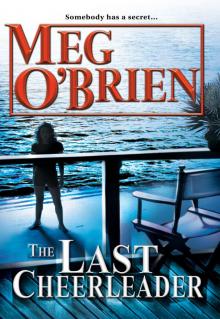 The Last Cheerleader
The Last Cheerleader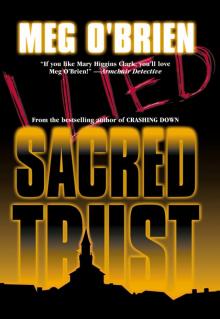 Sacred Trust
Sacred Trust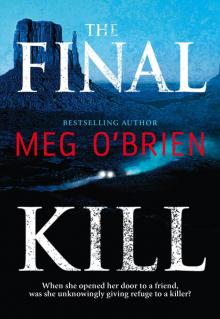 The Final Kill
The Final Kill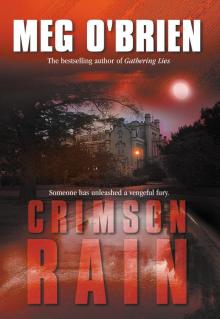 Crimson Rain
Crimson Rain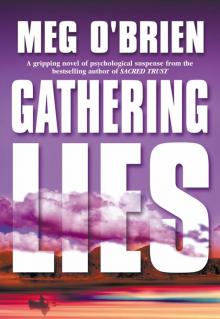 Gathering Lies
Gathering Lies